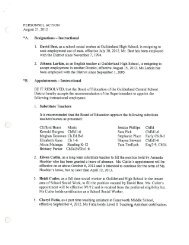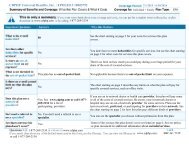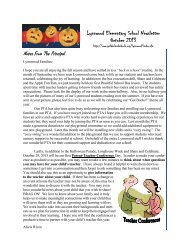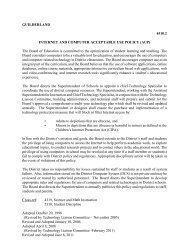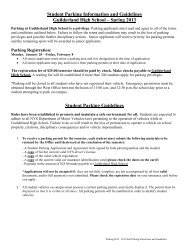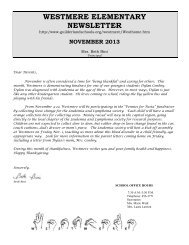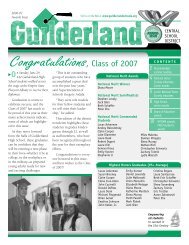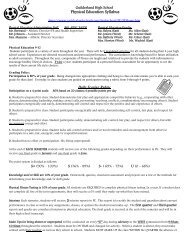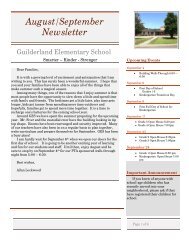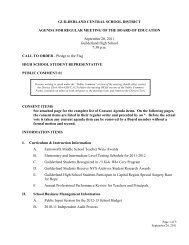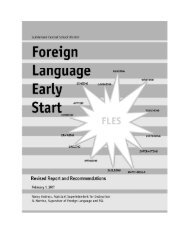English as a Second Language Program Evaluation - Guilderland ...
English as a Second Language Program Evaluation - Guilderland ...
English as a Second Language Program Evaluation - Guilderland ...
You also want an ePaper? Increase the reach of your titles
YUMPU automatically turns print PDFs into web optimized ePapers that Google loves.
1<br />
ESL PROGRAM EVALUATION<br />
GUILDERLAND CENTRAL SCHOOLS<br />
JANUARY 2013<br />
SUBMITTED BY: M. RANIERI, INSTRUCTIONAL ADMINISTRATOR
2<br />
Outline<br />
Part 1:<br />
1. Background information ESL<br />
2. Differences between beginner, intermediate, advanced, transitional<br />
Part 2:<br />
1. Demographics/Enrollment over time<br />
2. Shifts in Free/Reduced Lunch<br />
3. Shifts in Native <strong>Language</strong><br />
Part 3:<br />
1. Instructional Highlights (Simon IMovie)<br />
2. Goals and Objectives of the <strong>Program</strong><br />
3. What our Current ESL program entails (Staffing/Extravaganza)<br />
Part 4:<br />
1. Evaluative Piece<br />
2. Student <strong>as</strong>sessment (NYSESLAT results, graduation rates, NYS tests)<br />
3. Perception (Surveys)<br />
4. Parent videos<br />
Part 5:<br />
1. Next steps<br />
2. Challenges<br />
3. Needs<br />
ESL <strong>Program</strong> <strong>Evaluation</strong> Report January 2013<br />
Background Information<br />
School District: <strong>Guilderland</strong> Central Schools<br />
Type of <strong>Program</strong>:<br />
Freestanding ESL<br />
A - The district’s philosophy for the education of LEP students –<br />
The ESL department came together three years ago to create a mission statement (philosophy) that reflected the practices and beliefs not only<br />
of the ESL department but of the District <strong>as</strong> well. It is: “The ESL Department of the <strong>Guilderland</strong> Central School District, b<strong>as</strong>ed on our commitment to
cultural respect and understanding, seeks to incre<strong>as</strong>e the <strong>English</strong> language proficiency of <strong>English</strong> language learners and provide them with the tools<br />
to meet academic, personal, and social goals to effectively interact <strong>as</strong> productive member of the community.”<br />
Students are provided ESL instruction in a Sheltered <strong>English</strong> approach that allows for both push-in and pull-out cl<strong>as</strong>ses. <strong>Guilderland</strong> recognizes<br />
the importance of grouping students by proficiency level <strong>as</strong> well <strong>as</strong> by age and <strong>as</strong> such, the elementary, middle and high school programs are<br />
created around the academic and socio-emotional needs of our children.<br />
LEP’s are provided access to any and all services, which are provided and available in the <strong>Guilderland</strong> Central School District. These may be<br />
academic or extra-curricular in nature but are made available to all. ALL school programs and facilities are made available to all students and<br />
parents.<br />
B - Administrative practices and procedures to screen, identify and annually <strong>as</strong>sess LEP students –<br />
For the actual process of identification, see the attachment. The <strong>Guilderland</strong> Central School District strictly adheres to each of the steps for the LEP<br />
Identification Process <strong>as</strong> provided and outlined by the NYSED Office of Bilingual Education.<br />
The Home <strong>Language</strong> Questionnaire is administered to all new entrants to the district by the Central Registrar’s office. The Central Registrar h<strong>as</strong> a<br />
full understanding of the nature and importance of the HLQ and is careful to make sure that it is completed accurately. Both the ESL <strong>Program</strong><br />
Administrator <strong>as</strong> well <strong>as</strong> the District Office Team h<strong>as</strong> trained her. If a question or concern arises, the Central Registrar is quick to inform the<br />
<strong>Program</strong> Administrator before proceeding further. When the HLQ is completed, an oral interview occurs with parents and student/s. The ESL<br />
teacher along with a translator, <strong>as</strong> needed, does this. If on the home language questionnaire there is mention of a language other than <strong>English</strong>,<br />
testing will occur. The teacher and the families may discuss LEP testing. Arrangements are then made by the ESL teacher to formally <strong>as</strong>sess the<br />
student/s. ESL teachers send parents written notification that the LAB-R will be given. ELL’s are given the LAB-R within the first 10 days of the<br />
school year. The teacher will set the time/place/date of the test, and make sure the parents understand the nature and purpose of the test itself.<br />
Placement is determined by the NYS ESL criteria for placement for each grade level. ELLs must be at or below the determined cut off scores on the<br />
LAB-R to be in the ESL program.<br />
The results of this test, along with the teacher’s comments, are then p<strong>as</strong>sed along to the Supervisor of the program, along with a<br />
recommendation for placement or not. If placement is required, the ESL teacher then makes an appointment to speak with the parent/s and<br />
student to explain the ESL program to them. A schedule for each individual student is developed that provides for the required time/cl<strong>as</strong>ses in ESL<br />
<strong>as</strong> per NYSED.<br />
Assessment of the ESL population is both formal and informal and is ongoing throughout the year. The ESL teachers, often in conjunction with<br />
their regular cl<strong>as</strong>sroom teachers, administer these <strong>as</strong>sessments. The ESL teachers are in frequent contact with their core academic teachers to<br />
evaluate both academic and social progress that in turn informs their teaching practice. The NYSESLAT is administered to ALL ESL students and the<br />
results of this test determine their level of services for the following year.<br />
The ESL teacher closely monitors the LEP students’ academic progress. This is done through frequent contact with the core teachers who work<br />
with the ESL. Students in K-8 also take a series of NYS <strong>as</strong>sessments. These scores are also used by the ESL teacher to help determine the progress in<br />
the core subjects. A meeting with the core teachers is scheduled in order to review the overall performance of the ELL. The NYSESLAT is the<br />
culminating <strong>as</strong>sessment used to determine progress in <strong>English</strong> that is used to determine placement for the following year.<br />
3
C - A description of the nature and scope of the <strong>English</strong> <strong>as</strong> a second language and/or bilingual instructional program and services available to LEP<br />
students –<br />
Ple<strong>as</strong>e note that the number of students enrolled in ESL on any given year determines the actual number of cl<strong>as</strong>ses. Fully certified and<br />
experienced ESL teachers teach the cl<strong>as</strong>ses, which are both push-in and pull-out. The program is b<strong>as</strong>ed on a free-standing sheltered <strong>English</strong> model.<br />
The program is managed by the 12 month ESL Administrator. The ESL Administrator holds NYS permanent certification <strong>as</strong> a District-wide<br />
Administrator. The Administrator frequently attends professional development in order to stay informed of regulations, teaching practices and<br />
other issues throughout the year. The ESL Administrator is kept informed of all issues regarding the students, families, the program, placement, and<br />
the teachers. The Supervisor gives new teachers to the district training on how to work with the ESL teachers. They also learn about the role of the<br />
ESL teacher <strong>as</strong> well <strong>as</strong> their roles in helping students to develop <strong>English</strong> skills. The ESL Administrator frequently meets with students and parents to<br />
help in the explanation of services or to help welcome new entrants to our school. The Administrator also closely supervises the testing of all ESL<br />
students.<br />
Families of new ELL students are given tours of the building during which time the ESL teacher will explain the specific protocols of the<br />
school to them. Important items such <strong>as</strong> start/ending times, lunches, after-school time and transportation are clearly explained to them by the ESL<br />
teacher. Translators are used <strong>as</strong> required. If the new entrants arrive during the summer, a Title 3 funded K-8 summer program is available for the<br />
students. In this program students have a chance to begin the socialization process and to begin on working on their <strong>English</strong> skills in a low stress<br />
environment. Usually the instruction is designed around a topic from the students’ core cl<strong>as</strong>ses and then is developed by the ESL teacher. This gives<br />
the students an overview for the upcoming year.<br />
Parents are kept informed through the formal channels of report cards, open house meetings, conferences, and the district-wide web site<br />
and the big EXTRAVAGANZA in June of each year. The yearly EXTRAVAGANZA is a teacher organized event in which ALL the families of the ESL<br />
population are invited. A banquet is held, along with an awards ceremony. Also, student work is shared and some students perform.<br />
Teachers make frequent calls home to inform the parents of academic and social success <strong>as</strong> well <strong>as</strong> to explain any of the school-wide<br />
events, which might be new to them. Translators <strong>as</strong> well <strong>as</strong> translated documents (report cards, letters home etc.) are used freely, on an individual<br />
needs b<strong>as</strong>is. Meetings with parents include the use of translators <strong>as</strong> needed. The ESL Administrator maintains a current list of people who are<br />
available for translating.<br />
The ESL Administrator provides staff development to all new teachers during a district-wide staff development session in the summer.<br />
Throughout the year, the Supervisor provides workshops to the regular staff in terms of helping them to understand the ESL learner and how they<br />
are expected to help them and in which ways. The Supervisor also helps, especially at the middle and high school levels, with the <strong>as</strong>sessment piece<br />
for the regular cl<strong>as</strong>sroom teachers and h<strong>as</strong> set up a (temporary) P<strong>as</strong>s/Fail system (at the middle school) <strong>as</strong> a safety net for our very beginning<br />
learners in the core subjects, until they progress to such a point that they can be <strong>as</strong>similated more fully into the <strong>as</strong>sessment practices. This is always<br />
explained to the parents and is for a short period of time. ESL teachers also give presentations at staff meetings to update teachers on regulations,<br />
accommodations, and practices. In addition, there are ESL focus groups and collegial inquiry groups around ESL topics and address ways in which<br />
to best help all learners.<br />
4
As appropriate, the ESL Administrator informs the other Academic Supervisors about the opportunities so that all may participate in regular<br />
professional development. The ESL teacher often works one-on-one with staff to help them to better understand the nature of the ESL learner and<br />
how they can best help them. Biographical information about the ESL students is shared with the regular cl<strong>as</strong>sroom teachers.<br />
D - A description of the criteria used to place LEP students in appropriate bilingual or ESL instructional programs –<br />
The Home <strong>Language</strong> Questionnaire serves <strong>as</strong> the first step in placement. The results of the LAB-R, the informal interview and teacher input<br />
dictate the student’s placement in the age appropriate core cl<strong>as</strong>ses and the appropriate proficiency level of ESL cl<strong>as</strong>ses. In all c<strong>as</strong>es, the ESL<br />
teachers to inform them about the student, their unique needs, and to set up a plan for communication contact the regular core teachers. The<br />
teachers collaborate about strategies that are most efficient and effective that the regular teacher can implement in order to help that student.<br />
Once the level of proficiency h<strong>as</strong> been determined, the teacher creates a schedule that meets the NYS requirements for instruction, in conjunction<br />
with the core teachers.<br />
The parents are always notified of the results of the LAB-R and are also informed regarding the placement. Parents are also <strong>as</strong>ked about the<br />
student’s prior educational experiences <strong>as</strong> well: what grade level, grade reports if possible, personal likes and dislikes, and academic are<strong>as</strong> which<br />
might normally be challenging to the student. They receive written communication with regards to the final placement and it is always followed up<br />
by a personal contact from the teacher to help answer questions and to further explain the program. If specialized services are required, parents<br />
are informed and a request is made to them to allow these services to be delivered to their child (speech therapy, physical therapy, etc.).<br />
E - A description by building of the curricular and extracurricular services provided to LEP students<br />
In the elementary school, the ESL student may participate in:<br />
Chorus<br />
Band<br />
Orchestra<br />
Reading Clubs<br />
Enrichment activities and clubs<br />
Intramurals<br />
Mini-courses<br />
At the middle and high school level, there are a plethora of clubs and activities. They can be found on our website at www.guilderlandschools.org<br />
NOTE: Each student is provided with all the academics available to that child at the specific grade level. Attention is given so that each child’s<br />
schedule is personalized so <strong>as</strong> to allow <strong>as</strong> much time in the regular cl<strong>as</strong>sroom so that they may receive <strong>as</strong> much of the curriculum from the regular<br />
teachers <strong>as</strong> possible. Ancillary and support services are equally made available to them <strong>as</strong> well.<br />
F - A description of the district and school level procedures for the management of the program<br />
5
The program is directly managed by a district wide Administrator who is shared between ESL and World <strong>Language</strong>s K-12. This person provides<br />
the direct link between the teachers and the district office regarding the ESL program, its needs, and program status. The Administrator moves<br />
throughout the district to observe the program at all levels and to meet with ESL teachers, building administrators, and core area and support<br />
personnel. Often, the Administrator is called upon to meet with parents alongside the ESL teacher in order to help explain the program <strong>as</strong> well <strong>as</strong><br />
to provide other ESL related information to them.<br />
An ESL program is currently housed in each school. The teachers make constant use of staff development opportunities. Each of them regularly<br />
collaborates with our district ESL administrator who h<strong>as</strong> ties to local universities for up to date research and best practices. In the elementary<br />
schools, they work closely with the core teachers (reading teachers, etc.) to stay informed regarding research and practices. They have monthly<br />
meetings with the Supervisor where information is exchanged, new ide<strong>as</strong> and strategies surface, and issues are discussed. They also attend the<br />
annual NYSTESOL meeting <strong>as</strong> well <strong>as</strong> the many other opportunities provided by NYSUT.<br />
The <strong>Program</strong> Administrator helps to make sure that all test accommodations are made available to ALL ELLs at both the State and local level.<br />
The ESL teacher notifies parents in advance of the State Assessments. The teacher and the Administrator explain these tests and their importance<br />
to the parents.<br />
The Instructional Administrator for the ESL program coordinates the district’s funds for the LEP students with the support of the District Office<br />
Team. The Title III funds are most frequently used to provide after school and summer ESL programs focused on a specific topic/theme or are used<br />
for the purch<strong>as</strong>e of readers, books, dictionaries and technology <strong>as</strong> appropriate. After school programs are taught by the regular ESL teacher and are<br />
designed to provide an additional support to the LEP. Many times, after school programs provide extra help in preparation for a State Assessment.<br />
This is especially important in the area of social studies where the background knowledge required to be successful on this test is lacking for all the<br />
ELLs.<br />
Individual teachers may request materials through their building or through the ESL department. Title III funds are frequently used to help with<br />
the purch<strong>as</strong>e of materials and technology for student use.<br />
G- Procedures for the distribution of school-related information to parents of LEP students in the language they understand.<br />
• Phone calls, emails or letters home are made by the ESL teachers, program Administrator and by building principals. Translators may be<br />
used depending on the degree of <strong>English</strong> proficiency.<br />
• Written letters by the school, regular cl<strong>as</strong>sroom teacher or ESL teacher may be translated first before sending home. This is depending on<br />
the degree of <strong>English</strong> proficiency of the parent/s.<br />
• Email communications by all parties help to inform parents. These may be translated.<br />
• Accessing the school web-site also provides school-wide information to the parents. This is not translated.<br />
• Home visits, with or without a translator, occur frequently.<br />
H - Procedures for the submission of the results of the annual evaluation of LEP students<br />
Once the tests are completed and rated (speaking done by the certified and trained ESL teacher and writing done by 2 certified and trained<br />
teachers) the answer sheets are sent to the district office. When the district office data information officer verifies the answer sheets, they are then<br />
6
sent to NERIC where they are rated. The test materials are then returned to the distributor. When the results are returned to the district they are<br />
given directly to the Administrator and to the District Data Collector in the District Office. From this point the individual school results are given to<br />
the teachers.<br />
Once they have the results, they send home the required letter to the parents informing them of their child’s score, what level they will be<br />
in and a description of the ESL program for their child for the upcoming school year.<br />
I - Procedures for the referral of LEP students who are suspected of having a disability<br />
The evaluation of an LEP student is done <strong>as</strong> follows.<br />
1. The teacher, who notes a problem, speaks directly with the counselor and supervisor. The ESL teacher is informed and discusses this with<br />
the regular teacher. The program Administrator is immediately informed.<br />
2. Other teachers of core subjects are contacted in order to collect any pertinent date that will help to inform the ESL teacher and counselor.<br />
3. This information, along with any other anecdotal yet pertinent data, is then sent to the IST: Individual study team who then h<strong>as</strong> a<br />
preliminary meeting regarding the relevancy of the disability.<br />
4. A parent is contacted in order to see if they perceive any problems at home or if they have any additional information about the child that<br />
might help in determining whether or not the student is SPED.<br />
5. The Supervisor of the appropriate SPED program is also contacted and discusses the c<strong>as</strong>e with the ESL teacher. A referral for evaluation by<br />
the IST may be made at this time.<br />
6. The parent is called an informed about the need to <strong>as</strong>sess the student. A letter is also sent home. This letter is most frequently translated.<br />
The ESL teacher is involved so <strong>as</strong> to help the parent understand the process. A meeting with the parent is held to also explain this in person.<br />
7. The appropriate testing will take place with a translator if needed. Results are then collected and the IST then makes a decision to<br />
recommend services or not. The parent is informed of the results <strong>as</strong> well <strong>as</strong> the ESL teacher.<br />
8. If a program change is required, the parent is also notified so that they may provide input and so that any questions they have may be<br />
answered.<br />
The ESL teacher may be involved in explaining the program change to the student.<br />
NOTE: Parent contacts are done with a translator <strong>as</strong> needed.<br />
7
8<br />
Part 1: Section 2- Differences in service hours between Beginner, Intermediate, Advanced, and Transitional<br />
<strong>English</strong><br />
Proficiency<br />
Level<br />
Grades K-8<br />
Number of ESL<br />
Units<br />
ELA<br />
units<br />
Grades 9-12<br />
Number of ESL<br />
units<br />
ELA<br />
units<br />
Hours per<br />
school week<br />
Beginner 2 0 3 0 6<br />
Intermediate 2 0 2 0 6<br />
Advanced 1 1 1 1 3<br />
Transitional<br />
Testing<br />
accommodations<br />
1 Testing<br />
accommodations<br />
1 Testing<br />
accommodations<br />
Beginner and Intermediate Students receive between 6 and 9 hours per week, Advanced students receive 3 hours per week and Transitional<br />
students have tested out of ESL but receive testing accommodations for up to 2 years after testing out of ESL. The only way to receive ESL services<br />
is to test in via the LAB-R exam, and the only way to stop ESL services is to test out of ESL with the NYSESLAT exam by testing Proficient in all four<br />
domains (listening, speaking, reading and writing).
9<br />
Part 2: Section 1-Demographics/Enrollment over time<br />
NAME OF<br />
SCHOOL<br />
2002-2003 2003-2004 2007-2008 2008-2009 2009-2010 2010-2011 2011-2012 2012-2013<br />
AES 2 3 2 1 0 0 2<br />
FMS 28 20 13 25 21 23 18<br />
GES 26 30 38 45 48 45 77<br />
GHS 21 36 18 20 20 14 19 22<br />
LES 1 6 10 11 8 10 15<br />
PBES 1 3 5 8 8 13 13<br />
WES 6 14 16 20 20 20 26<br />
TOTAL<br />
STUDENTS<br />
SERVICED<br />
Incomplete Incomplete 94 89 128 119 128 173
10<br />
Part 2: Section 2-Shifts in Free/Reduced Lunch Numbers<br />
<strong>Guilderland</strong> Central School District is at a level of 9.15% Free and Reduced Lunch Rate, up from 8% where it h<strong>as</strong> been for years. The free and<br />
reduced program, and its requirements have not changed at all. Therefore, more families than ever are qualifying for free and reduced lunches for<br />
their children. The forms are now online so families can fill them out from home, work, or the library and submit online <strong>as</strong> well.<br />
School Year<br />
Number of ELL students receiving<br />
F/R lunch<br />
Number of students cl<strong>as</strong>sified <strong>as</strong><br />
LEP<br />
2008-2009 18 123 15%<br />
2009-2010 16 136 12%<br />
2010-2011 31 120 26%<br />
2011-2012 32 128 25%<br />
2012-2013 33 134 25%<br />
% Of ELL students out of the<br />
total population of LEP students<br />
receiving F/R lunch<br />
Part 2: Section 3-Shifts in Native <strong>Language</strong><br />
Current native languages represented in our schools are:<br />
Chinese<br />
Korean<br />
Many Indian Dialects (Hindi, Urdu, Marathi, Telugu, Punjabi, Tamil, Malayalam,<br />
Turkish<br />
Russian<br />
Arabic<br />
French<br />
Bengali<br />
Vietnam<br />
Hebrew<br />
Prior to the p<strong>as</strong>t few years, the majority of our students came from Korea and China. This can be attributed to incre<strong>as</strong>ed job possibilities here in<br />
the Capital Region with TSMC, Nano Science Center, and Global Foundries. Many families are also coming to the US to be closer to their relatives<br />
and escape dangerous conditions within their home countries.
11<br />
Part 3: Section 2- Goals and Objectives of the <strong>Program</strong><br />
Goals of the ESL <strong>Program</strong> for <strong>Guilderland</strong> Central Schools<br />
1. Students will successfully test out of receiving ESL services between 2-4 years time<br />
2. Students will equally improve their b<strong>as</strong>ic interpersonal communication skills (BICS) and cognitive academic language program skills (CALP)<br />
3. ESL Students and their families will feel safe, appreciated, empowered, challenged, supported and welcome within the <strong>Guilderland</strong> Central<br />
Schools<br />
4. ESL students will have access to the same programs, services, and support <strong>as</strong> their native <strong>English</strong> speaking peers<br />
5. ESL students will bring another perspective on language and culture that they can share with our other students to foster a greater<br />
appreciation for Global Diversity <strong>as</strong> aligned with our District Priorities<br />
Alignment of the District Priorities with Goals and Objectives of ESL <strong>Program</strong><br />
1. Students will develop the language, cultural technological and civic skills necessary to adapt and respond to a rapidly changing 21 st Century<br />
world<br />
2. Strong and supportive school cultures will promote a sense of participation, safety and security for all students<br />
3. Schools will embrace partnerships with parents and community to provide meaningful connections to support social and emotional<br />
development<br />
4. Students will be supported early and systematically via coordinated and specialized intervention systems and specialists<br />
5. Students will acquire and utilize b<strong>as</strong>ic <strong>English</strong> literacy, language proficiency and numeracy to achieve goals and communicate effectively in<br />
the digital age<br />
Part 3: Section 3- Current ESL <strong>Program</strong> at <strong>Guilderland</strong><br />
Current Staffing within our buildings for ESL Specialists:<br />
1.0 GHS Elizabeth Kelley<br />
1.0 FMS Stephanie LInders<br />
1.0 WES Jennifer Politano<br />
1.0 LES/PBES Simon Levy<br />
1.0 GES Nora Upton<br />
1.0 GES Laura Reddington<br />
1.0 GES Jeanne Lee (for Katherine Nelson who is on leave)<br />
.75 from BOCES Ester Sal<strong>as</strong>oo & Amanda Bucci who service students at LES, AES, and WES
12<br />
ESL Extravaganza<br />
The annual ESL Extravaganza is a district-wide meeting and event for ALL parents of ELLs <strong>as</strong> well <strong>as</strong> district-wide teachers and administrators.<br />
Transportation is provided for parents <strong>as</strong> necessary. The event is held every June at Farnsworth Middle School. Parents each bring a dish to p<strong>as</strong>s<br />
that is native to their cultural heritage. There are annually about 250 people in attendance, and students create performances, artwork, and<br />
displays for their parents to see while in attendance. There is also a raffle for families and students with prizes donated from local establishments<br />
such <strong>as</strong> Price Chopper, TGI Friday’s, Little Book House, stores in Crossgates Mall and many others which are appealing to students. Throughout the<br />
night there is food, dancing, musical performances, video clips of students in their ESL cl<strong>as</strong>srooms, and a time for families to interact with one<br />
another and make new friends.<br />
Part 4: Section 1- Student <strong>as</strong>sessment results<br />
• Most of our students who are serviced by ESL test out within 2-3 years. Only 9 of our students have been in ESL for longer than 2-3 years.<br />
This is often due to other additional learning needs.<br />
• 2010-2011 104 students were tested with the NYSESLAT exam<br />
• 2011-2012 113 students were tested with the NYSESLAT exam<br />
ESL Surveys<br />
1) Elementary Survey for ESL<br />
Ple<strong>as</strong>e circle either the happy face or sad face and return to your teacher.<br />
1. I like ESL. <br />
2. My ESL teacher helps me with reading. <br />
3. My ESL teacher helps me with writing. <br />
4. My ESL teacher listens to me. <br />
5. I feel safe in the ESL cl<strong>as</strong>sroom.
13<br />
2) Middle School Survey for ESL<br />
Directions: Ple<strong>as</strong>e answer the following questions to the best of your ability.<br />
(1 is strongly agree, 2 is agree, 3 is neutral, 4 is disagree, 5 is strongly disagree)<br />
1. I like ESL. YES NO Why?<br />
________________________________________________________________________________________________<br />
2. My ESL teacher helps me with reading. YES NO [1 2 3 4 5]<br />
3. My ESL teacher helps me with writing. YES NO [1 2 3 4 5]<br />
4. My ESL teacher listens to me. YES NO [1 2 3 4 5]<br />
5. I feel safe in the ESL cl<strong>as</strong>sroom. YES NO [1 2 3 4 5]<br />
6. Anything else you would like to add?<br />
__________________________________________________________________________________________________<br />
3) ESL SURVEY DECEMBER 2012 GUILDERLAND HIGH SCHOOL<br />
1. Do you like ESL? Yes no Why?<br />
2. How does your participation in ESL help you prepare your Math, Science, <strong>English</strong> or Social Studies homework or cl<strong>as</strong>swork?<br />
3. How does the ESL cl<strong>as</strong>s improve your <strong>English</strong> abilities?<br />
4. How does your ESL teacher advocate for your education?<br />
5. Do you consider your ESL teacher a resource? Yes no why?<br />
6. What kinds of questions do you <strong>as</strong>k your ESL teacher? (Choose a letter below-more than one choice is ok)<br />
a. About life skills<br />
b. About my schedule or courses to take<br />
c. College prep type questions<br />
d. About activities, sports, or clubs<br />
e. How to get access to different things in <strong>Guilderland</strong>
14<br />
4) Alumni Survey for ESL<br />
1. Did you like ESL? YES NO Why?<br />
2. How did your ESL teacher help you with your Math, Science, <strong>English</strong>, Social Studies homework or cl<strong>as</strong>swork? YES NO Why?<br />
3. How did the ESL cl<strong>as</strong>s improve your <strong>English</strong> abilities?<br />
4. Did you consider your ESL teacher a resource? YES NO Why?<br />
5. What kinds of questions did you <strong>as</strong>k your ESL teacher?<br />
6. How do you feel your time in ESL affected your later success in life?<br />
7. What do you remember most about ESL during your time at <strong>Guilderland</strong>?<br />
8. Do you have any other information or comments related that you could share with us?<br />
9. How long were you an ESL student in <strong>Guilderland</strong> Schools? ____________ How w<strong>as</strong> your experience?<br />
10. Are you currently enrolled in a 4 year school? YES NO<br />
11. Are you currently enrolled in a 2 year school? YES NO<br />
12. Are you or have you served in the Armed Forces (Military, Army, Marines, Air Force)? YES NO<br />
13. Are you currently working full time? YES NO<br />
14. How many languages do you speak fluently? 1 2 3 4 5 more than 5<br />
15. Would you recommend the ESL program at <strong>Guilderland</strong> School to others? YES NO Why?
15<br />
5) PARENTS OF ESL STUDENTS<br />
1. The ESL program is helpful to my child (ren). YES NO I DON’T KNOW<br />
2. My child h<strong>as</strong> been in <strong>Guilderland</strong> schools for ________ years.<br />
3. The ESL program is helpful to me. YES NO I DON’T KNOW<br />
4. What does the ESL program help your child with?<br />
_________________________________________________________________________________<br />
5. My child’s <strong>English</strong> skills are better because of ESL. YES NO I DON’T KNOW<br />
6. I would like there to be workshops related to <strong>English</strong> <strong>Language</strong> Learners. YES NO I DON’T KNOW<br />
7. I would like to have more workshops about:<br />
______________________________________________________________________________________<br />
8. Do you have any other information or comments that you could share with us?<br />
_________________________________________________________<br />
Thank you for your time. Ple<strong>as</strong>e return in the envelope provided to your child’s ESL teacher <strong>as</strong> soon <strong>as</strong> possible. Have a great day! ☺<br />
6) Teacher/Counselor/Staff/School Administrator Survey<br />
1. The ESL Teacher(s) in my building is flexible and accommodating. YES NO I DON’T KNOW<br />
2. The <strong>as</strong>sistance provided by the ESL program enables our students to perform better in school. YES NO I DON’T KNOW<br />
3. Communication with the ESL program members is effective, professional and timely in nature. YES NO I DON’T KNOW<br />
4. I have attended Professional Development related to <strong>English</strong> <strong>Language</strong> Learner education. YES NO I DON’T KNOW<br />
5. I would like there to be more professional development offerings related to <strong>English</strong> <strong>Language</strong> Learners. YES NO I DON’T KNOW<br />
6. The ESL program members are receptive to suggestions related to student’s performance. YES NO I DON’T KNOW<br />
7. The ESL teacher in my building is available for parent conferences, IST meetings, and RTI meetings. YES NO I DON’T KNOW<br />
8. Members of the ESL department play a strong advocacy role for our <strong>Guilderland</strong> families. YES NO I DON’T KNOW<br />
9. I have had experience working with <strong>English</strong> <strong>Language</strong> Learners. YES NO I DON’T KNOW<br />
10. The ESL program provides resources <strong>as</strong> needed for professional knowledge related to second language acquisition and the unique demands<br />
of <strong>English</strong> <strong>Language</strong> Learners.YES NO I DON’T KNOW<br />
11. How many years have you taught within the <strong>Guilderland</strong> School District? YES NO I DON’T KNOW<br />
12. Do you have any other information or comments related that would like to share with us? _______________________________________<br />
Survey Results
1. Elementary Survey Results<br />
16
17<br />
2. Middle School Survey Results<br />
Question Comments Yes No 1 2 3 4 5<br />
I like ESL<br />
* Because it's fun and it helps me<br />
16<br />
with my <strong>English</strong>. I also like it<br />
because I get help from my<br />
homework.<br />
* I feel safe in there and it helps me a lot.<br />
*I like ESL because it helps kids from all over the world when they<br />
come to speak better <strong>English</strong>.<br />
* Because teachers help me with homework and making my <strong>English</strong><br />
better.<br />
* I like ESL because I can come and <strong>as</strong>k questions and teachers in<br />
ESL help me with homework. ESL teachers also teach me vocabulary<br />
words and ESL is so helpful.<br />
* I like ESL because our teacher helps us. And she talks slowly and<br />
we understand better<br />
* I can rest in ESL during tutorial period or access period<br />
* Because ESL teacher help my homework<br />
* I love ESL because I get to eat lunch here and have fun and learn<br />
and I get to talk to friends here and watch movies and play games<br />
and take tests, and get any help I need.<br />
* It gives me some time to do some homework and time to<br />
do/learn more reading<br />
* Because I can play games<br />
* I like ESL because ESL cl<strong>as</strong>s is really funny and fun<br />
* Ms. Linders are really nice. They have awesome teaching skills.<br />
* Because when we have test we doing it in ESL and we understand<br />
and people help us<br />
* Because it is fun, sometimes we play game<br />
* I like ESL because it is fun and the teachers are nice. ESL is number<br />
one<br />
* Have fun during lunch time and help us with our needs such <strong>as</strong><br />
writing, reading, science and math, social studies and French.<br />
My ESL teacher helps me with 17 15 2
eading?<br />
My ESL teacher helps me with<br />
17 16 4 1<br />
writing?<br />
My ESL teacher listens to me? 17 17<br />
I feel safe in the ESL cl<strong>as</strong>sroom? 17 15 1 1<br />
Anything else you would like to<br />
add?<br />
* I like having student teachers.<br />
I like access and tutorial in ESL.<br />
* ESL helps me the most in homework<br />
* ESL helps the kids socialize with other people/peers and learn more.<br />
* I like to student teachers because when Ms. Linders is not here, the student teachers can help us. There<br />
should be more teachers because all kids need help and only one teacher is not enough. I wish I could do ESL<br />
more because I miss doing my work when I have chorus.<br />
* I like coming to ESL because I feel comfortable in ESL. I also like it when we to ESL if we have test because<br />
ESL teachers can explain what questions mean in the test and help me with vocabulary words.<br />
* I like when my teacher (Ms. Linders) helps me at the test and she helps me a lot.<br />
* I like that I can borrow any books in the ESL cl<strong>as</strong>sroom.<br />
* ESL is the best! I love it because I feel safe here and can relax. I love ESL.<br />
* I would like to have more time with homework to check it back and she gives me some help that I need<br />
* ESL is helpful and fun. I like lunch period<br />
* I like to eat lunch in the ESL room<br />
* I like the volunteer teachers. I like the help in the morning and when we come here in lunch<br />
* I want Ms. B stay here<br />
* I like all the ESL teachers. I like them because they help me with my homework<br />
* Hanging out with friends during lunch and let us play a game. Other adults to help students of what they<br />
need<br />
18
3. High School Survey Results<br />
Question Yes No Unanswered Why<br />
Do you like ESL? 11 0 0 * Fun and very helpful<br />
* because I can meet my cl<strong>as</strong>smates who is also like me<br />
(learning ESL)<br />
* it helps me with <strong>English</strong> and I meet a lot of friends there.<br />
* It helps me a lot and Mrs. Kelley helps me what I can't<br />
understand<br />
* It is funny and cool<br />
* Because it's helpful<br />
* because it's fun<br />
* ESL is very fun and I have lots of friends. We can have many<br />
group works<br />
* because it’s very happy been a part of cl<strong>as</strong>s<br />
* it’s helpful<br />
How does your participation in ESL help<br />
you prepare with you Math, Science,<br />
<strong>English</strong> or Social Studies homework or<br />
cl<strong>as</strong>swork?<br />
*Yes because we can learn what should we do and not in the cl<strong>as</strong>s… culture<br />
* It makes me confidence levels very high. It makes me understand <strong>English</strong> better and doing well in my<br />
other cl<strong>as</strong>ses<br />
* The teacher will go to my cl<strong>as</strong>sroom when I'm having a lab<br />
* When I don't understand homework or cl<strong>as</strong>swork I usually <strong>as</strong>k to Mrs. Kelley. Then she helps me<br />
happily.<br />
* Not really<br />
* Mrs. Kelley helps a lot<br />
* sometimes we learn some things<br />
* we can correct our homework and we can check grammar<br />
* correct essay of <strong>English</strong>, check and help homework<br />
* It helps a lot, we learn words from ESL<br />
* it’s helpful<br />
Question Yes No Unanswered Why<br />
19
How does the ESL cl<strong>as</strong>s improve your<br />
<strong>English</strong> abilities?<br />
How does your ESL teacher advocate<br />
for your education?<br />
* Yes speaking and grammar<br />
* It makes me feel good and helps me to understand <strong>English</strong> better. Whenever I don't understand<br />
something my teacher help me to understand it. I understand it better when the teachers explain it to<br />
me personally or 2nd time or wrong common <strong>English</strong>.<br />
* It's more emph<strong>as</strong>is on oral <strong>English</strong><br />
* grammar, listening, speaking<br />
* grammar part is improved<br />
* all the ways - speaking, writing and listening<br />
* vocabs and writing skills<br />
* speaking/listening<br />
* homework, write and speak<br />
* learn words and grammar<br />
* listening skill<br />
* When there is a problem like lost something<br />
* By helping me to understand the concept of my <strong>as</strong>signments. Helping with my grades (giving advice<br />
on what to do to improve my grades). Giving me an opportunity to take other cl<strong>as</strong>s test here, which<br />
makes me more comfortable.<br />
* Teacher is my tutor when I'm studying. And when I have some trouble, my teachers will help me out.<br />
* Grammar and check pronunciation<br />
* really well<br />
* they help us with homework<br />
* for subjects and getting extra help<br />
* Homework in cl<strong>as</strong>s time. Mrs. Kelley takes a note for me and it w<strong>as</strong> very great because my listening<br />
and talking notes are very ______________<br />
* pay attention on everything<br />
* when I <strong>as</strong>k questions she answers it<br />
Question Yes No Unanswered Why<br />
20
21<br />
Do you consider your ESL teacher a<br />
resource?<br />
10 0 1 * My teacher always helps me in after school<br />
* Whenever I have a problem with anything I get the solution<br />
from her. She is the person who can make me happy in any<br />
situation. I am in my element when I am with her.<br />
* Yes because they help me study<br />
* Yes because she helps me <strong>English</strong> and even personal things<br />
* Because she helps me a lot<br />
* Mrs. Kelley is so helpful<br />
* She can give me a definition of <strong>English</strong> words<br />
* Mrs. Kelley can give me definition of words and explain e<strong>as</strong>ily<br />
* because it's important<br />
What kind of questions do you <strong>as</strong>k your<br />
ESL teacher?<br />
About life skills 6<br />
About my schedule or course to take 7<br />
College prep type questions 4<br />
About activities, sports or clubs 7<br />
How to get access to different things 8<br />
in <strong>Guilderland</strong><br />
4. Parent Survey Results<br />
Question Yes No I don't know<br />
The ESL program is helpful to my<br />
56 2<br />
child (ren)?<br />
My child h<strong>as</strong> been in <strong>Guilderland</strong> 3-9 months 1 year 2 years 3 years 4 years 5 years<br />
For_______ years. 5 21 14 4 0 0<br />
The ESL program is helpful to me. 13
22<br />
What does the ESL program help you<br />
child with?<br />
* Reading and math.<br />
* <strong>English</strong> getting better. He can read lots of words now.<br />
Sometimes he can teach me <strong>English</strong>. I'm happy ESL help my<br />
son.<br />
* He can speak more than he did before.<br />
* Pronunciation, reading, writing.<br />
* Incorporate the meaning in <strong>English</strong> of the things she already<br />
knows in Spanish.<br />
* Learn more <strong>English</strong><br />
* She’s good reading and talking.<br />
* Learn more about <strong>English</strong><br />
* His reading and writing skills, and <strong>English</strong> pronunciation have<br />
improved.<br />
* As far <strong>as</strong> I can see his speaking is better then before. He is<br />
getting better recently. He just needs to make more practice<br />
to improve himself.<br />
* Better <strong>English</strong><br />
* It helps my child with writing skills especially how to write<br />
critically. It also helps with reading fluency.<br />
* Learn to write <strong>English</strong><br />
* Everything<br />
55<br />
My child's <strong>English</strong> skills are better<br />
because of ESL.<br />
I would like for there to be workshops 37 8 3<br />
related to ELL's.<br />
Question Yes No I don't know<br />
I would like to have more workshops<br />
about:<br />
* How to help my children to read <strong>English</strong> at home.<br />
* How to help my child to learn <strong>English</strong>.<br />
* This is the first year of my child in ESL and she is very young<br />
(grade K) she is making good progress in incorporate new<br />
vocabulary, probably at this stage is to have more workshops<br />
with vocabulary learning goals.<br />
* Reading and writing.<br />
* He needs more workshops, which are reading, speaking,
23<br />
and listening practice to improve his <strong>English</strong>.<br />
* Writing, reading and listening.<br />
Do you have any other information or<br />
comments that you could share with us?<br />
* We are appreciative for the help that ESL have given to my<br />
son.<br />
* I only want you to spend more time with him to solve these<br />
problems. The re<strong>as</strong>on of this comment we always talk Turkish<br />
to each other at home. Because we cannot speak <strong>English</strong> very<br />
well. Ple<strong>as</strong>e pay attention to this situation<br />
5. Alumni Survey Results<br />
Question Yes No Why/Comment<br />
Do you like ESL? 25 1 * Yes, it helped me to get used to a new environment and improve my <strong>English</strong>.<br />
* I like ESL cl<strong>as</strong>s. I like my teacher and my cl<strong>as</strong>smates<br />
* there are a lot of interesting books to read and people to talk with<br />
* ESL made me feels comfortable living in America and going to an American<br />
school. The ESL teacher w<strong>as</strong> also kind and generous so she made me happy to go<br />
to American school.<br />
How did your ESL teacher help you<br />
with Math, Science, <strong>English</strong>, Social<br />
Studies homework or cl<strong>as</strong>swork?<br />
26 * Sometimes I couldn't understand what the teacher said in cl<strong>as</strong>s. My<br />
ESL teacher explained it to me using simpler <strong>English</strong>.<br />
* Every time I have questions to <strong>as</strong>k my teacher, she always helps me patiently.<br />
* They help me with my oral language and <strong>English</strong> writing by checking my papers,<br />
correcting my pronunciation and giving me a further understanding of the<br />
common words in daily lives.<br />
* She helped me translate complicated <strong>English</strong> sentences or p<strong>as</strong>sages into Korean<br />
by reading together so that I could understand the homework or cl<strong>as</strong>swork e<strong>as</strong>ily.
24<br />
How did the ESL cl<strong>as</strong>s improve your<br />
<strong>English</strong> capabilities?<br />
Did you consider your ESL teacher a<br />
resource?<br />
What kinds of questions did you <strong>as</strong>k<br />
your ESL teacher?<br />
How do you feel your time in ESL<br />
affected your later success in life?<br />
* In the ESL cl<strong>as</strong>sroom we had to speak only in <strong>English</strong>. Even though all the conversations<br />
weren't perfect <strong>English</strong>, it helped me to get rid of fear I had of speaking in <strong>English</strong>.<br />
Also the teacher gave us team projects. I think this w<strong>as</strong> the greatest help in improving<br />
my <strong>English</strong>.<br />
* Reading helps me to remember more words and writing helps me to put words together to make<br />
sentences. I like read and write.<br />
* They talk with me and encourage me, if needed; they give me a hard push to make a leap in my<br />
<strong>English</strong> study.<br />
* In ESL cl<strong>as</strong>s I read many <strong>English</strong> books or played <strong>English</strong> board games so that I have a lot of<br />
contacts with <strong>English</strong>. As I read and comprehended <strong>English</strong> p<strong>as</strong>sages a lot, my <strong>English</strong> abilities got<br />
improved.<br />
24 * Yes because she h<strong>as</strong> watched many students with similar homework<br />
every year, she gave me suggestions when I couldn't start my<br />
homework. Also when I couldn't understand things related to cultural<br />
differences, she gave me answers.<br />
* My ESL teacher is a resource to me because I learn a lot from her.<br />
* They are always responding my related emails and other demand; especially<br />
they are doing their best to help me integrate into the new environment.<br />
* Because she w<strong>as</strong> always beside me, ready to help me anytime.<br />
* Most of the time I <strong>as</strong>ked her to correct grammar errors in writing. I also <strong>as</strong>ked about<br />
Americans' culture.<br />
* My of my questions are related to my every day learning.<br />
* What does this word mean? How to make others understand me.<br />
* I <strong>as</strong>ked lots of vocabularies or grammar rules so that I don't get lost while reading long <strong>English</strong><br />
sentences.<br />
* I can say that I improved most of my <strong>English</strong> through the ESL program, which will<br />
definitely help me when I have to communicate with foreigners later.<br />
* I had a great time in ESL. I made up my mind that I will keep studying and get my <strong>English</strong> better<br />
and better<br />
* My time in ESL let me touch <strong>English</strong>, feel <strong>English</strong> and think in <strong>English</strong>, after that, I become to love<br />
<strong>English</strong> and try my best to be a good speaker.<br />
* Because of ESL I am now comfortable talking with <strong>English</strong> speaking people. It will make me<br />
communicate and express my thoughts to other people e<strong>as</strong>ily and better in my life.
What do you remember most about<br />
ESL during your time at <strong>Guilderland</strong>?<br />
Do you have any other information<br />
or comments related that you could<br />
share with us?<br />
How long were you an ESL student in<br />
<strong>Guilderland</strong> schools and how w<strong>as</strong> the<br />
experience?<br />
* The l<strong>as</strong>t project I had to do w<strong>as</strong> to prepare a presentation about fl<strong>as</strong>hback and<br />
foreshadowing. I guess I remember this most clearly because I w<strong>as</strong> the leader<br />
of my team. I not only learned about what fl<strong>as</strong>hback and foreshadowing is<br />
but also how to lead a group.<br />
* I remember most about ESL are: my teacher is nice and helpful, my cl<strong>as</strong>smates and I are all good<br />
friends. We study together and help with each other.<br />
* Halloween party and my departing time at <strong>Guilderland</strong> is so unforgettable the smiling faces of Ms.<br />
Linders, my teachers and my friends are storing in my head forever.<br />
* The most memorable event I had about ESL is the ESL party that I had before I leave America. I<br />
could remember my beautiful memories in ESL.<br />
* ESL cl<strong>as</strong>s helps child to get used to school life e<strong>as</strong>ily and smoothly no matter where the child came<br />
from.<br />
I really appreciate their help.<br />
* I hope ESL would be there to help more students like me.<br />
* It would be better ESL program if it h<strong>as</strong> a lot of books or system for Korean too just like it h<strong>as</strong> for<br />
Chinese and Japanese.<br />
* 2 years… I think it influenced me a lot in a good way even though the actual<br />
time I spent there w<strong>as</strong>n't long.<br />
* 5 months… I had been an ESL student in <strong>Guilderland</strong> and had a great time there with my teacher<br />
and cl<strong>as</strong>smates.<br />
* 1 year… it is great.<br />
* 2 years... It w<strong>as</strong> the most important and beautiful memory I had in my life in America. It helped<br />
me learn a lot of things such <strong>as</strong> <strong>English</strong> and social skills.<br />
18 2<br />
Are you currently enrolled in a 4 year<br />
school?<br />
Are you currently enrolled in a 2 year<br />
3 In Korea there is only a 3 year school<br />
school?<br />
Question Yes No Why/Comment<br />
Are you or have you served in the<br />
4<br />
Armed Forces (Military, Army, Navy, or Air<br />
Force)?<br />
Are you currently working full time? 4<br />
How many languages do you speak<br />
fluently?<br />
29 = 2 languages<br />
25
26<br />
Would you recommend the ESL<br />
program at <strong>Guilderland</strong> Schools to others?<br />
26 * Yes because it really helps students to get adapted to new<br />
environment.<br />
* I will recommend the ESL program at <strong>Guilderland</strong> to others because I want other<br />
children get the help <strong>as</strong> much <strong>as</strong> I did. I really appreciate their help.<br />
* It is good to the people with <strong>English</strong> learning problems.<br />
* It will make students from other countries learn <strong>English</strong> f<strong>as</strong>t and fun<br />
6. Teacher/Staff/Counselor/Administrator Survey Results<br />
Question Yes No I don't<br />
know<br />
Sometimes<br />
Years<br />
teaching<br />
for GCSD<br />
0-5<br />
Years<br />
teaching<br />
for<br />
GCSD<br />
6-10<br />
Years<br />
teaching<br />
for GCSD<br />
11-20<br />
Years<br />
teaching<br />
for<br />
GCSD<br />
21-30<br />
Years<br />
teaching<br />
for<br />
GCSD<br />
30 or<br />
more<br />
The ESL teacher(s) in my building is<br />
flexible<br />
and accommodating.<br />
The <strong>as</strong>sistance my ESL teacher provides<br />
enables<br />
my students to perform better in<br />
school.<br />
Communication with the ESL teacher is<br />
effective, professional and timely in<br />
nature.<br />
I have attended professional<br />
Development<br />
related to ELL education.<br />
I would like there to be more<br />
professional<br />
development offering related to ELL's.<br />
The ESL teacher in my building is<br />
receptive to<br />
suggestions related to our shared<br />
150 18 3<br />
123 18 2<br />
119 21 1<br />
54 68<br />
71 38 7<br />
105 3 2
27<br />
students'<br />
performance.<br />
The ESL teacher in my building is 95 1 8 1<br />
available for<br />
parent conferences, IST meetings and<br />
RTI<br />
meetings.<br />
The ESL teacher in my building plays an 108 1 2<br />
advocacy role for the families.<br />
I have had experience working with 108 12<br />
ELL's.<br />
Question Yes No I don't<br />
know<br />
Sometimes<br />
The ESL teacher is a resource for<br />
professional<br />
knowledge related to second language<br />
acquisition and the needs of ELL's.<br />
How many years have you taught<br />
within the<br />
GCSD?<br />
107 5 3<br />
Years<br />
teaching<br />
for GCSD<br />
0-5<br />
Years<br />
teaching<br />
for GCSD<br />
6-10<br />
Years<br />
teaching<br />
for<br />
GCSD<br />
11-20<br />
Years<br />
teachi<br />
ng for<br />
GCSD<br />
21-30<br />
6 15 2 1<br />
Years<br />
teaching<br />
for<br />
GCSD<br />
30 or<br />
more
28<br />
Do you have any other information or<br />
comments related that you could share<br />
with us?<br />
* Stephanie is always readily available for the needs of the ESL students. She also offers us useful<br />
suggestions and strategies to make our lessons helpful for the ESL students. Excellent communication<br />
and a ple<strong>as</strong>ure to work with each day.<br />
* Haven't worked with Simon Levy in a number of years but when I did it w<strong>as</strong> fine. Not extremely<br />
involved (pull out). That is the re<strong>as</strong>on for the IDK above.<br />
* Stephanie provides a welcoming and "safe" place for ESL kids, she goes above and beyond and the kids<br />
respond beautifully to her approach. She creates almost like an ESL "family" to support her kids<br />
social/emotional and behavioral and academic needs. She is also always willing to consult and<br />
collaborate.<br />
* Great instruction within the ESL department.<br />
* It is amazing. I think this would be especially helpful in terms of teaching writing. Absolutely! Our ESL<br />
department takes a whole child approach to learning... that includes what impacts students outside of<br />
school.<br />
* The ESL program is a great resource for me <strong>as</strong> an ESL cl<strong>as</strong>sroom teacher.<br />
* The students seem to be comfortable having a place to go for ESL support. Especially how it relates to<br />
students who have speech/language disorders. Coordinating <strong>as</strong>sessment and treatment with ESL needs<br />
is always a challenge. The presentations at staff meetings were useful.<br />
* With the incre<strong>as</strong>e of jobs in the area in the field of t3echnology, I believe our ELL population will only<br />
continue to grow. Therefore, ELL professional development should be mandatory for all educators in the<br />
district, <strong>as</strong> ELL students deserve the same quality instruction <strong>as</strong> our <strong>English</strong>-speaking students.<br />
* Having only 1 ESL teacher prohibits communication at team meetings and the ability to share<br />
pertinent resources to improve teaching strategies for these kids.<br />
* When there is support in the cl<strong>as</strong>sroom for students who are new to the country and do not speak<br />
<strong>English</strong>.<br />
* It's been very helpful to have Marcia Ranieri attend our meetings for ELL kids
29<br />
ESL Survey Data Analysis: Important Points<br />
• Elementary Student Survey: Students who participated in the elementary surveys overwhelmingly felt that they like ESL; their teacher<br />
helps him or her with reading and writing, listens to the students, and helps him or her to feel safe in the cl<strong>as</strong>sroom.<br />
• Middle School Student Survey: Middle School students enjoy ESL, feel helped with reading and writing, safe in their ESL cl<strong>as</strong>sroom and<br />
enjoy being able to eat lunch with their ESL cl<strong>as</strong>smates and teacher in the ESL cl<strong>as</strong>sroom each day.<br />
• High School Survey: All of the students (11) who responded to the High School ESL survey enjoy being in the ESL cl<strong>as</strong>s, and feel that the<br />
time they do spend in ESL helps them to be fully prepared for their other cl<strong>as</strong>ses. In addition, students feel the ESL teacher advocates for<br />
him or her when there is a problem, by helping with their <strong>as</strong>signments to improve their grades, by helping with homework <strong>as</strong> needed, and<br />
answering sensitive questions when they are not sure who else to <strong>as</strong>k. Most students responded that they <strong>as</strong>k their ESL teacher questions<br />
about how to gain access to different clubs, activities, and places around <strong>Guilderland</strong>. Students also felt it w<strong>as</strong> very helpful when the ESL<br />
teacher broke down words that they found troublesome or beyond their comprehension level.<br />
• Alumni Student Survey: Of the 22 Alumni students who were in ESL all responded positively about their participation in ESL and<br />
improvement in their language abilities. 16 of the 22 students are currently enrolled in a 4 year college and feel their experience in ESL<br />
helped prepared them to be successful in doing so. All of the 22 students feel comfortable saying they speak 2 languages fluently.<br />
• Parent Survey: The 41 Parents of ESL students feel that the ESL program helps their child feel welcome, improve their <strong>English</strong> skills and that<br />
their child’s language skills are better because of ESL. The ESL program h<strong>as</strong> also helped parents learn how to help their child at home with<br />
reading, speaking, listening, writing and other language support. Most families have been here between 1-3 years in the <strong>Guilderland</strong> ESL<br />
program. 64.3% of parents would like there to be more workshops for them related to the needs of their children <strong>as</strong> <strong>English</strong> <strong>Language</strong><br />
Learners.<br />
• Teacher/Administrator/Counselor/Staff Survey: 80% of staff feel that the ESL teacher is flexible and accommodating within their buildings<br />
district wide, 70% of staff feel that communication is effective between ESL teachers and their respective buildings, 61% of staff would like<br />
there to be more workshops related to ESL professional development, but only 42% of staff have attended workshops that have been<br />
offered in the p<strong>as</strong>t. 98% of staff feel that the ESL teacher in their building is receptive to suggestions and feedback, 95% of staff feel that<br />
the ESL teacher is available to communicate with parents and other teachers on an <strong>as</strong> needed b<strong>as</strong>is, 99% of staff feel that the ESL teachers<br />
are advocates for their students. Only 88% of staff that responded h<strong>as</strong> had experience working with ESL students during their career here<br />
at <strong>Guilderland</strong>. L<strong>as</strong>tly, 96% of staff feels that the ESL teacher is a valuable resource for professional knowledge related to ELLs.
30<br />
Part 5: Next Steps, Challenges, Future Goals for the ESL program<br />
• Proposed implementation of an ESL/Reading Recovery Position (.5)<br />
o This person would service students who fall into the range of needing ESL and Tier 2 and Tier 3 RtI intervention support.<br />
o This individual would be certified in ESL and then go through the year long training to become certified in Reading Recovery.<br />
o Reading Recovery is an appropriate intervention to support language and literacy development for <strong>English</strong> language learners.<br />
Success is likely related to the 1:1 interactions designed for each individual learner and to the quality of the oral language exchanges<br />
in Reading Recovery.<br />
Supportive Research<br />
• Neal and Kelly (1999) examined outcomes for 3,992 ELLs in Reading Recovery and found that the success rate for these children compared<br />
favorably with the total population of Reading Recovery Children in California. They also found that the children had scores within the<br />
average range of a random sample of their grade-level peers.<br />
• Reading Recovery serves approximately 16,000 ELLs in the US each year, and about 15% of all Reading Recovery students.<br />
• Sufficient research h<strong>as</strong> been am<strong>as</strong>sed (Askew et al., 1988; The Ohio State University and Reading Recovery Council of North America, 1999;<br />
Brown et al., 1999) to conclude that early intervention <strong>as</strong> a system innovation can work considerably to reduce early reading failure.<br />
• Reading Recovery, <strong>as</strong> a specific model of early intervention, achieves its stated goal to enable the lowest-performing children to accelerate<br />
their progress in a relatively short period of time, thereby making it possible for them to “catch up” to their peers.<br />
• Shanahan and Barr (1995), in their independent evaluation of Reading Recovery, conclude that Reading Recovery attains its stated goal by<br />
bringing the children’s learning up to that of their average-achieving peers. They report that many children leave the program with well<br />
developed reading strategies, including phonemic awareness and spelling knowledge.<br />
• Fluent ESL children have a higher success rate with Reading Recovery (66.3%) compared to native <strong>English</strong> speakers (62.2%) or LEP students<br />
(61.7%). However, it appears that limited <strong>English</strong> proficient children were just <strong>as</strong> successful <strong>as</strong> their native <strong>English</strong> speaking peers.<br />
• The longer we wait to help children who are behind, the greater the gap between them and their peers. Children who have difficulties in<br />
the beginning stages of learning to read fall further and further behind their cl<strong>as</strong>smates (Stanovich, 1996).<br />
Challenges<br />
• Meet all the service hour requirements of our learners since beginner and intermediate students receive 6 hours per week. Our current<br />
teachers on staff are servicing students during all periods of the day, at any time they can get time with the students. We need to look<br />
at the incre<strong>as</strong>e in staff servicing <strong>English</strong> language learners with professionals that are dedicated to our <strong>Guilderland</strong> students and their<br />
families.
Future Goals<br />
• Investigate the possibility of offering more push-in services where students are given support within the general education cl<strong>as</strong>sroom<br />
• Implement a Reading Recovery ESL specialist<br />
• Incre<strong>as</strong>e our number of certified ESL specialists<br />
• Cluster students at the elementary grade levels so that students can be serviced in groups making it e<strong>as</strong>ier for the ESL teacher to service<br />
those students who are in a particular grade level together<br />
• Schedule the middle school ESL teacher so that this person can be available to team with the teams that the ESL students are a part of<br />
to participate in meetings, and greater discussions about the students serviced<br />
• Central ESL registration, enrollment, coordination, grant funding, translator acquisition, etc. so parents are comfortable finding the<br />
access and help they need with a seamless process<br />
• Educating the district <strong>as</strong> a whole about these new families that enter our schools each day so they are welcome, warm, accepting, and<br />
patient.<br />
31



